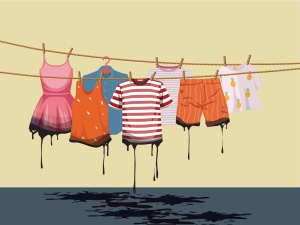
Fossil Fashion
Today’s fashion industry has become synonymous with overconsumption, a snowballing waste crisis, widespread pollution and the exploitation of workers in global supply chains. What is less well known is that the insatiable fast fashion business model is enabled by cheap synthetic fibres, which are produced from fossil fuels, mostly oil and gas. Polyester, the darling of the fast fashion industry, is found in over half of all textiles and production is projected to skyrocket in the future. Our campaign exposes the clear correlation between the growth of synthetic fibres and the fast fashion industry – one cannot exist without the other. The campaign calls for prompt, radical legislative action to slow-down the fashion industry and decouple it from fossil fuels.
Spotlight

Spinning Greenwash: How the fashion industry’s shift to recycled polyester is worsening microplastic pollution
Reports

Spinning Greenwash: How the fashion industry’s shift to recycled polyester is worsening microplastic pollution

Fashion's Plastic Paralysis: How Brands Resist Change and Fuel Microplastic Pollution
International fashion brands are doubling down on their use of synthetic fibres – a key driver of microplastic pollution – while employing distraction and delay tactics to protect their fast fashion business...

Crude Couture: Fashion Brands' Continued Links to Russian Oil
This report offers a one-year follow-up from the "Dressed to Kill" report, evaluating whether fashion brands have ended their connections with contentious suppliers using Russian oil and coal.

Take-Back Trickery: an investigation into clothing take-back schemes
This report tracked 21 items from 10 fashion brands through their take-back schemes. Despite the slogans, three quarters of items were either destroyed, left in warehouses or exported to Africa.

Trashion: The stealth export of waste plastic clothes to Kenya
This report shows that the amount of second-hand clothing flowing to Kenya from global sources has grown significantly in recent years and the system of used-clothing trade is currently at breaking point.

Synthetics Anonymous 2.0: Fashion’s persistent plastic problem
Synthetics Anonymous 2.0 uncovers the lack of progress that has been made by the fashion industry to kick its synthetics addiction.

Dressed to Kill: Fashion brands’ hidden links to Russian oil in a time of war
This report exposes the hidden supply chain links between major global fashion brands and retailers and Russian oil used to make synthetic clothing.

Licence to Greenwash: How certification schemes and voluntary initiatives are fuelling fossil fashion
This report provides an in-depth investigation into 10 major certifications, labels and voluntary industry initiatives in the fashion sector. It finds that the majority of these schemes are acting as sustain...

A New Look for the Fashion Industry: EU Textile Strategy and the Crucial Role of Extended Producer Responsibility
This report and briefing focuses on Extended Producer Responsibility (EPR), a powerful market-based policy tool that is expected to be at the centre of the upcoming Textiles Strategy.

Synthetics Anonymous: fashion brands’ addiction to fossil fuels
This report investigates the behaviour of some of the biggest fashion brands and retailers regarding their use of synthetic fibres and transparency about doing so.

Fossil fashion: the hidden reliance of fast fashion on fossil fuels
This report reveals the hidden reliance of the fast fashion industry on fossil fuels. It also uncovers how the oil and gas industry are betting on production of plastic as a growing share of their revenue.
Latest Press Releases
Other Media & Publications
Why making clothes from plastic bottles will not solve fashion’s waste crisis

Take-Back Trickery
Trashion Trailer 2023
Synthetics Anonymous 2.0: Fashion’s persistent plastic problem
Are your clothes funding the war in Ukraine?
Licence to Greenwash: how certification and voluntary schemes are fuelling fossil fashion
How fossil fuels are the backbone of fast fashion
Synthetics Anonymous: fashion brands’ addiction to fossil fuels
